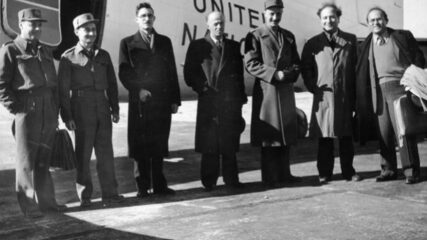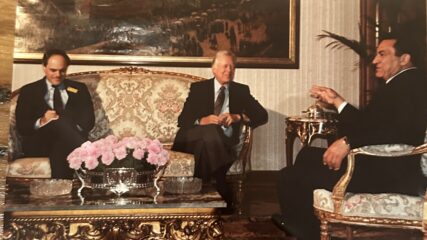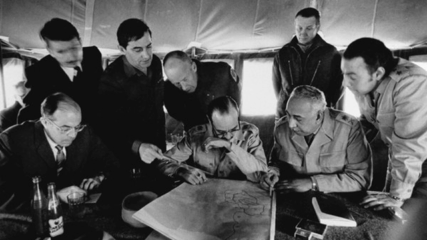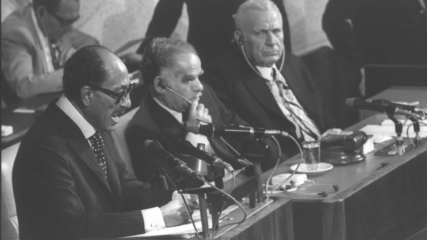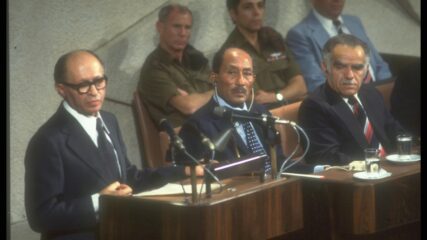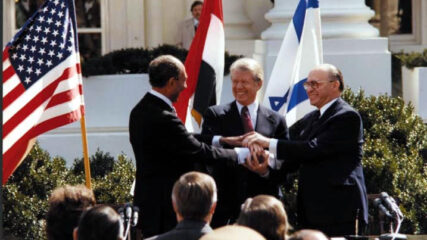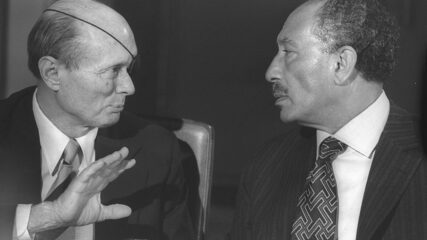December 19, 2024
Hafez Ismail was a close adviser to Egyptian President Anwar Sadat. Ismail carried out secret negotiations with Henry Kissinger before the 1973 war to see if the U.S. would quietly start talks with the Israelis. Kissinger said no. Ismail provides notable insights into Sadat's sophisticated decision-making.
October 1973-January 1974
In carrying out research in the 1990s for Heroic Diplomacy: Sadat, Kissinger, Carter, Begin and the Quest for Arab-Israeli Peace, Routledge, 1999, I undertook 84 interviews with individuals who participated in the diplomacy.
January 5, 1993
Omar Sirry provides intimate details of the diplomatic aftermath of the October 1973 War, the Kilometer 101 talks, Kissinger’s choreography of the December 1973 Middle East peace conference, and admiration for Sadat as the “modern Egyptian Pharaoh” who was not ever politically passive but took repeated initiatives for Egypt’s benefit.
November 10, 1992, and July 7, 1993
Tahsin Bashir served as spokesman for Egypt and for the Arab League in many capacities from 1963 to 1978. He knew Anwar Sadat intimately, revealing that Sadat kept his own counsel while using others to test political and diplomatic options. His long-term goal was to reorient Egypt away from Moscow and obtain Sinai's return. Sadat cleverly managed others, including Kissinger, Carter and his own advisers.
November 10, 1992
General Ghani el-Gamasy served as Egypt's chief of staff during the October 1973 war, executed Egypt's limited success across the Suez Canal, and negotiated with an Israeli counterpart, General Aharon Yariv, the details of the Kissinger-choreographed Kilometer 101 talks, which led to the January 1974 Egyptian-Israeli Disengagement Agreement. Gamasy was surprised when Sadat told him at Aswan then, "Egypt was making peace with the United States and not with Israel." Gamasy to Yariv, "We (the Egyptians) are finished with the Palestinians."
May 13, 1992 and June 17, 1993
In the 1970s, US State Department Ambassador Michael Sterner was privy to Sadat's preference for step-by-step diplomacy PRIOR to the 1973 October War. He is critical of the Carter administration for being too satisfied with only a bilateral Egyptian-Israeli Agreement.
January 18, 1974
The US mediates an agreement separating forces in Sinai after the 1973 War; Egyptian and Israeli
generals will negotiate additional details.
September 4, 1975
Cairo and Jerusalem agree to additional Sinai withdrawals, demilitarized zones, limited force zones and, importantly, placement of US civilians in Sinai to monitor observance of agreement.
April 11, 1991
Hermann Eilts played a pivotal role in representing the U.S. to Egypt and vice versa in the vital 1973-1980 period when Egypt embraced Washington and turned away from Moscow, and made peace with Israel. Eilts knew Egyptian President Sadat as well as any American official in the period. He provides rich detail and vivid insights into Sadat's often mercurial decision-making.
September 4, 1977
Unknown to the Carter administration and one month before it issued the US-Soviet Declaration to convene an international Middle East Peace Conference, Prime Minister Begin tells the cabinet that he learned from the Rumanian president that Sadat wishes to have Israeli and Egyptian representatives meet in secret talks. That bi-lateral Dayan -Tuhami meeting takes place on September 16. Begin refers to advanced drafts of proposed treaties between Israel and each Arab state; he presents details about Rumanian Jewish immigration to Israel.
December 6, 1977
December 6, 1977 Source in Hebrew: Note: Israel National Archives published on November 27, 2013, about 40 classified documents that described the secret contacts and the preparations for Sadat visit to Jerusalem on November 20,...
January 1, 1978
As part of a joint statement, President Carter makes promises regarding US’ role in coming Political-Military Committee Talks in Cairo and Jerusalem. Likewise presenting a four-point formula for resolving the conflict, these statements contribute to US-Israeli tensions.
September 6, 1978
September 6, 1978, 6 p.m. Source: Israel State Archives/Box/A4314/1 Notes taken by Elyakim Rubinstein in the Israeli delegation’s discussion about a meeting Prime Minister Menachem Begin had with President Jimmy Carter and President Anwar Sadat...
September 17, 1978
With President Carter mediating, Sadat and Begin agree to two outlines: a framework for a treaty between them and to define Palestinian “autonomy,” not self-determination or a state for them.
July 26, 2023
The Camp David accords culminated after thirteen days of intense negotiations between Israeli, Egyptian, and American delegations. Egyptian and Israeli leaders met with President Carter where after difficult negotiations they signed two accords, one an outline for an Egyptian-Israeli Treaty and one for Palestinian self-rule. The negotiations continued for another six months until the Egyptian-Treaty was signed in March 1979, after considerable bad feeling was tossed back and forth between Israeli and American negotiators.
September 29, 1978
Dayan made the case to the knesset that it should vote in favor of the Camp David Accords stipulating why doing so would be in Israel's long term interest. He stated specifically that there was no promise for a Palestinian state, IDF forces would remain in the West Bank, negotiations for a peace treaty would continue, and these agreements were signed by the President of Egypt and the President of the US.
1978-2000
Perspective provides valuable insights in evaluating contemporary diplomacy. Though neither the Palestinian-Israeli-U.S. summit of July 2000 nor the Egyptian-Israeli-U.S. summit of September 1978 ended discussions between Israel and its Arab adversaries, there were more differences than similarities between the two intense and highly charged meetings.
